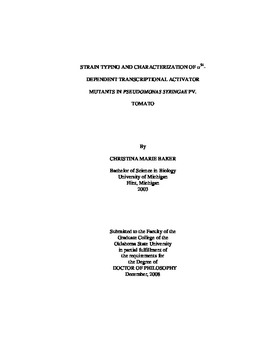| dc.contributor.advisor | Bender, Carol L. | |
| dc.contributor.author | Baker, Christina Marie | |
| dc.date.accessioned | 2013-12-10T18:04:31Z | |
| dc.date.available | 2013-12-10T18:04:31Z | |
| dc.date.issued | 2008-12 | |
| dc.identifier.uri | https://hdl.handle.net/11244/7719 | |
| dc.description.abstract | Scope and Method of Study: Pseudomonas syringae pv. tomato DC3000 (Pst DC3000) is a gram-negative plant pathogenic bacterium that is virulent on tomato, Brassica spp. and Arabidopsis. One aspect of this study was the utilization of variable number tandem repeat loci (VNTR) by multiple locus variable number tandem repeat analysis (MLVA) for typing of P. syringae pv. tomato. The specific objectives of this project were to: (i) design and identify VNTR primer sets useful for strain typing; and (ii) use these to type a collection of P. syringae pv. tomato strains. A second aspect of this study focused on the characterization of &sigma 54 -dependent transcriptional activator mutants of Pst DC3000. The main objectives of the study were to (iii) verify and complement transcriptional activator mutants in Pst DC3000 and determine the phenotype on host and nonhost plants; and (iv) analyze &sigma 54 -dependent transcriptional activator mutants for traits relevant to specific activator (motility, nutrient utilization, alginate production). | |
| dc.description.abstract | Findings and Conclusions: Objective I. 34 VNTR primer sets were designed and five of these were identified for strain typing. These primer sets were used to type a collection of 58 P. syringae pv. tomato strains, and 23 different MLVA sequence types were identified (Objective II). This is the first report using MLVA to type a large collection of P. syringae pv. tomato strains of diverse origin. Objectives III and IV: The DC3000- fleQ mutant was non-motile, non-flagellated, and defective in biofilm formation, traits that were restored with a complementing clone; whereas the DC3000- dctD2 mutant was defective in the ability to transport and/or utilize succinic acid as a carbon source. All of the mutants were able to elicit the HR on tobacco, and DC3000- algB showed a reduction in symptom production on Arabidopsis, suggesting a role for alginate in Pst DC3000 virulence. In summary, this study shows that &sigma 54 -dependent activator genes in Pst DC3000 are important for pathogenicity, nutrient assimilation, and various physiological processes. | |
| dc.format | application/pdf | |
| dc.language | en_US | |
| dc.rights | Copyright is held by the author who has granted the Oklahoma State University Library the non-exclusive right to share this material in its institutional repository. Contact Digital Library Services at lib-dls@okstate.edu or 405-744-9161 for the permission policy on the use, reproduction or distribution of this material. | |
| dc.title | Strain typing and characterization of σ54-dependent transcriptional activator mutants in Pseudomonas syringae pv. tomato | |
| dc.contributor.committeeMember | Fletcher, Jacqueline | |
| dc.contributor.committeeMember | Melcher, Ulrich | |
| dc.contributor.committeeMember | Hunger, Robert M. | |
| osu.filename | Baker_okstate_0664D_10127.pdf | |
| osu.accesstype | Open Access | |
| dc.type.genre | Dissertation | |
| dc.type.material | Text | |
| dc.subject.keywords | activator | |
| dc.subject.keywords | mlva | |
| dc.subject.keywords | pseudomonas | |
| dc.subject.keywords | syringae | |
| dc.subject.keywords | tomato | |
| dc.subject.keywords | virulence | |
| thesis.degree.discipline | Plant and Soil Sciences | |
| thesis.degree.grantor | Oklahoma State University | |
